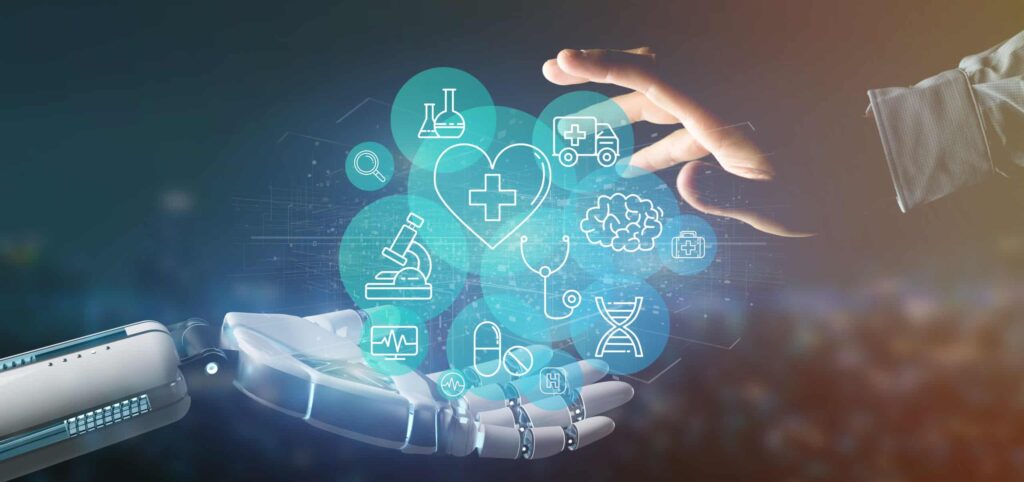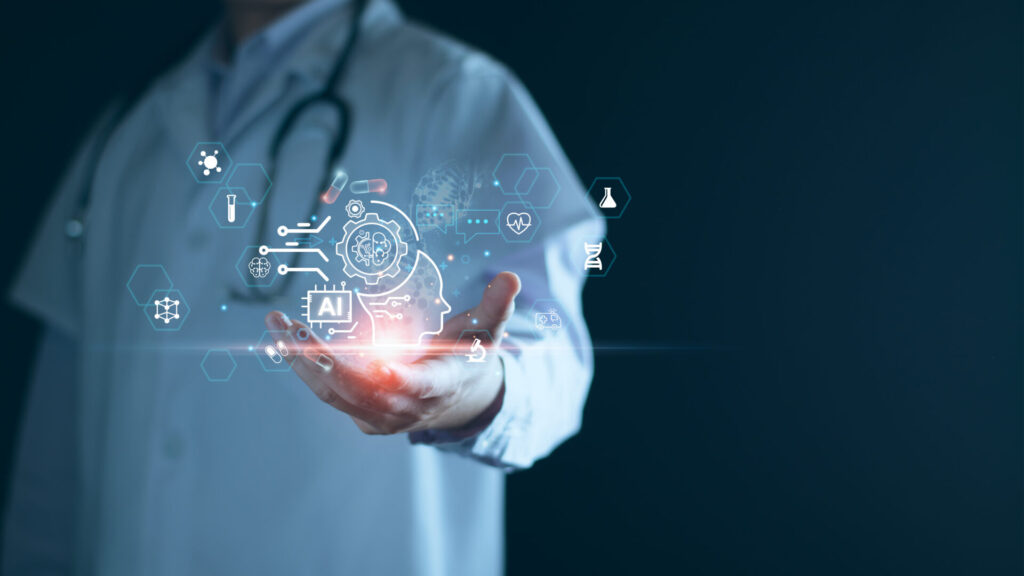Blog
The Role of AI in Predicting and Preventing Illnesses
Artificial Intelligence (AI) is revolutionizing the field of healthcare by enabling early detection, accurate diagnosis, and proactive prevention of diseases. By analyzing vast amounts of data quickly and effectively, AI systems are transforming how illnesses are predicted and managed, offering a glimpse into a future of personalized, preventative medicine.
In this article, we’ll explore the role of AI in predicting and preventing illnesses, the technologies driving this revolution, and how they’re reshaping healthcare for better outcomes.
1. How AI Predicts Illnesses
AI excels in processing complex datasets and identifying patterns that are often imperceptible to human observation. In healthcare, this capability translates into predictive insights that can identify risks before symptoms appear.

Key Methods AI Uses to Predict Illnesses:
- Analyzing Medical Records:
- AI models scan electronic health records (EHRs) to identify patterns in patient histories.
- Predicts potential conditions based on age, genetics, lifestyle, and previous diagnoses.
- Genomic Analysis:
- AI interprets genetic data to identify predispositions to illnesses like cancer or genetic disorders.
- Tailors preventative strategies based on an individual’s genetic makeup.
- Health Monitoring Devices:
- Wearables and sensors collect real-time data on heart rate, blood pressure, and activity.
- AI detects anomalies and flags early warning signs of conditions like arrhythmias or hypertension.
- Environmental and Lifestyle Data Integration:
- Combines data on air quality, diet, exercise, and stress levels to assess risks for chronic diseases.
2. AI in Preventing Illnesses
Preventing illness involves taking proactive steps to mitigate risks. AI empowers healthcare providers and individuals by providing actionable insights and interventions tailored to specific needs.
Key Applications of AI in Preventative Healthcare:
- Personalized Health Recommendations:
- AI-driven apps and platforms suggest dietary changes, exercise routines, and stress management techniques.
- Example: AI-based fitness apps like Noom and MyFitnessPal customize health plans based on user data.
- Early Warning Systems:
- AI-powered devices like smartwatches monitor vitals and issue alerts for irregularities.
- Example: The Apple Watch’s ECG feature detects atrial fibrillation, enabling early intervention.
- Vaccination Strategies:
- AI models predict disease outbreaks, helping authorities optimize vaccination campaigns.
- Example: During the COVID-19 pandemic, AI predicted outbreak hotspots and vaccine distribution needs.
- Behavioral Health Interventions:
- AI monitors mood and stress levels through wearable devices, suggesting relaxation techniques to prevent mental health crises.
3. Technologies Driving AI in Healthcare
The effectiveness of AI in predicting and preventing illnesses relies on various technologies and tools:
1. Machine Learning (ML):
- Algorithms learn from historical data to predict health outcomes.
- Example: Predicting hospital readmissions based on patient profiles.
2. Natural Language Processing (NLP):
- Analyzes unstructured data like doctor’s notes or social media posts for health insights.
- Example: Identifying mental health concerns from text analysis.
3. Neural Networks:
- Mimic the human brain’s processing to detect complex patterns.
- Example: Image recognition for identifying cancerous tumors in medical scans.
4. Big Data Analytics:
- Integrates and analyzes data from diverse sources, including EHRs, wearables, and public health records.
5. Internet of Medical Things (IoMT):
- Network of connected medical devices provides real-time monitoring and data sharing.
- Example: Continuous glucose monitors for diabetes management.
4. AI Applications in Specific Illnesses
AI has demonstrated remarkable potential in predicting and preventing specific diseases:
1. Cardiovascular Diseases:
- Predictive Analytics: Identifies individuals at risk of heart attacks or strokes by analyzing cholesterol levels, blood pressure, and lifestyle factors.
- Wearables: Devices like Fitbit and Garmin use AI to monitor heart rate variability and flag irregularities.
2. Diabetes:
- Prevention Tools: AI predicts the onset of type 2 diabetes based on weight, family history, and activity levels.
- Smart Devices: Continuous glucose monitors (CGMs) use AI to suggest insulin adjustments.
3. Cancer:
- Screening and Detection: AI models analyze mammograms, CT scans, and biopsies for early detection of cancer.
- Genetic Risk Assessment: AI identifies individuals predisposed to hereditary cancers like BRCA-related breast cancer.
4. Mental Health:
- Chatbots and Apps: Tools like Woebot and Wysa use AI to provide mental health support and interventions.
- Predictive Models: AI analyzes speech patterns, activity levels, and social media to detect signs of depression or anxiety.
5. Infectious Diseases:
- Outbreak Prediction: AI models forecast the spread of diseases like COVID-19 or influenza, enabling early public health interventions.
- Antibiotic Resistance Monitoring: AI predicts resistance patterns, guiding appropriate treatment strategies.
5. Benefits of AI in Predicting and Preventing Illnesses

- Early Detection:
- AI identifies conditions before symptoms appear, allowing for timely intervention.
- Personalized Healthcare:
- Tailored recommendations ensure that prevention strategies are effective and relevant.
- Improved Accuracy:
- Reduces human error by analyzing vast datasets with precision.
- Cost Savings:
- Preventing illnesses reduces the need for expensive treatments and hospitalizations.
- Enhanced Accessibility:
- AI-powered tools bring healthcare insights to remote or underserved populations.
6. Challenges in AI-Driven Healthcare
While the potential of AI in healthcare is immense, several challenges need to be addressed:
1. Data Privacy and Security:
- AI relies on sensitive health data, raising concerns about data breaches and misuse.
2. Bias in Algorithms:
- If training datasets are not diverse, AI predictions may reflect biases, leading to inequitable care.
3. Integration with Healthcare Systems:
- Adopting AI tools requires compatibility with existing healthcare infrastructures.
4. Regulation and Ethics:
- Clear guidelines are needed to ensure the ethical use of AI in healthcare.
7. The Future of AI in Preventative Healthcare
As AI continues to evolve, its role in healthcare will expand further:
1. Predictive Precision Medicine:
- AI will integrate genetic, environmental, and behavioral data to offer hyper-personalized prevention strategies.
2. Global Health Monitoring:
- AI models will predict and mitigate health risks at a population level, including pandemics and chronic disease trends.
3. AI-Driven Virtual Health Assistants:
- Advanced assistants will provide real-time health advice and behavioral nudges to promote healthy living.
4. AI-Powered Drug Development:
- Predictive AI will accelerate the discovery of drugs for disease prevention.
8. Practical Examples of AI in Action
1. IBM Watson Health:
- Analyzes medical data to predict patient risks and suggest treatment options.
2. Google DeepMind:
- Detects diabetic retinopathy in early stages by analyzing retinal scans.
3. Biofourmis:
- Uses AI to monitor chronic conditions and predict health deteriorations.
4. BlueDot:
- Predicted the COVID-19 outbreak by analyzing global travel and health data.
Conclusion
AI is transforming healthcare by enabling a shift from reactive to proactive medical care. Its ability to predict and prevent illnesses ensures early intervention, reduces healthcare costs, and improves patient outcomes.
As AI continues to advance, its integration with wearable devices, EHRs, and big data analytics will create a future where personalized, preventative medicine is accessible to all. While challenges like data privacy and bias need to be addressed, the potential of AI in predicting and preventing illnesses remains undeniably promising, paving the way for a healthier tomorrow.

